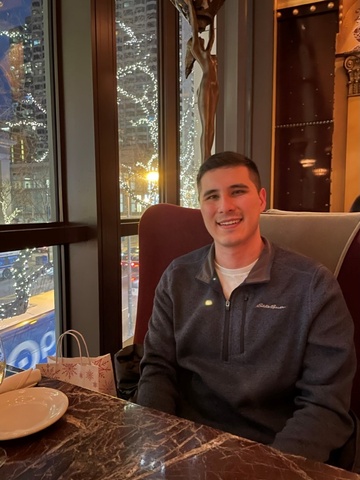
Caleb Escudero, a second-year medical student from Aurora, Illinois, had never participated in research until the summer before he started medical school. He quickly learned that he loved the scientific process of discovering new solutions to complicated problems—such as the common problem of childhood ear infections. Placing tympanostomy tubes, more commonly known as “ear tubes,” is the most common childhood surgery in the United States with over 667,000 cases per year, according to the American Journal of Public Health. Escudero presented research on a new way to potentially reduce complications with this common procedure at the 2022 Medical Student Research Conference.
What sparked your interest in pursuing research during medical school?
My interest in research first came from a passion for learning. Learning about different topics and gaining new information is something that really excites me, and that is one of the reasons that I wanted to pursue medicine. I went to a small undergraduate college, which didn’t have much emphasis on research, and it wasn’t until the summer before I started medical school that I had the opportunity to do any research. I found very quickly that I enjoyed taking a deep dive into topics and attempting to contribute to the depth of information that we have right now. I also really love the idea that we are constantly searching for new solutions to problems that have eluded us for potentially decades.
What do you enjoy most about performing research?
I most enjoy the connections and relationships that I've formed through my research. I have found fantastic mentors that actively want to help me to succeed in the future. The relationships that I have made through research have opened many doors for my future. I also really appreciate that research teaches important skills, such as problem solving, that have numerous applications outside of research.
What did you present at the conference?
My research this summer involved grafting a gel onto the inner surfaces of ear tubes. The hydrogel has properties that make it extremely attractive to water, which allows for a layer of water to form along the surface of the gel when implanted in the body. This is extremely desirable for many applications, including tympanostomy tubes. The first problem that we had to overcome was finding a way to graft the gel onto the inner surface of the tube. This sounds very simple, but it took a lot more thought than you would think! Once we had the coated tubes, we tested how mucus interacts with the coated tubes, compared to uncoated tubes. We showed that the gel significantly improves the flow of mucus through the tube. This is extremely important because mucus sitting in the tube statically is a driving force in the formation of mucus plugs. This has the potential to prevent tube plugging significantly, which prevents the need for further medical visits, prescriptions, and potential operations required to correct plugging.
What are you thinking of doing next in your medical career?
I'm still not 100% sure what medical field I want to go into, but otolaryngology is currently at the top of my list. I find the field immensely interesting and fulfilling, and I’m excited to explore a future in it.
What advice do you have for others interested in doing research during their medical education?
My best advice is to find a mentor that truly wants you to succeed and has goals that align with yours. Creating achievable goals alongside my mentor has led to the best experiences I've had.